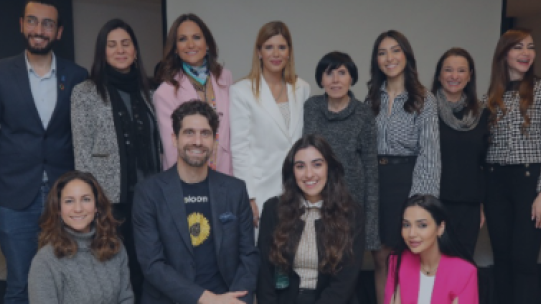Empowering Women as a Strategic Advantage: KristiesLab’s Blueprint for Change
Start Reading

1. Company at a Glance
In this case study, we explore how KristiesLab, a woman-led creative marketing and communications agency, embeds gender equality into its operations to drive business success, economically empowers women across Lebanon and the MENA region, and sets a new standard for inclusive innovation. Through strategic storytelling, sustainable practices and initiatives, KristiesLab proves that equality isn’t just a moral imperative—it’s a competitive edge.
Strategic Marketing, Creative Agency & Events Management
Industry
2009
Founded
Lebanon
Headquarters
90
Number of Employees
Lebanon, Qatar, UAE, Kuwait and Saudi Arabia
Global Presence
2. The Challenge
In the dynamic marketing and communications sector, persistent gender gaps—such as limited female leadership, ingrained biases, and cultural resistance—continue to hinder innovation and constrain regional growth. Operating across Lebanese and MENA markets while facing economic crises and deeply rooted social norms, KristiesLab encountered skepticism as a woman-led firm.
Founder and CEO Christina Khater turned these challenges into strengths, leveraging diversity to drive innovation, meet growing client demands and economically empower women through initiatives like The KnowHer Initiative, outlined below.
3. The Action
Redefining Leadership and Storytelling
Establishing a Gender-Inclusive Leadership Framework
KristiesLab began by reshaping its internal leadership structures to ensure women were not only represented, but also positioned in key decision-making roles. This move went beyond symbolic representation; it was a foundational shift in how leadership was defined and cultivated within the company. By reviewing hiring and promotion policies, the company actively addressed bias and introduced processes that supported equitable career progression. The objective was to build a workplace where women could grow in strategic roles and thrive in an environment that valued their leadership. This also involved establishing clear, measurable targets for female representation across all levels of the organization—particularly in decision-making roles such as department heads, project leads and client-facing leadership positions—while ensuring transparency and accountability throughout the process.
Strategic Investments
To amplify the reach of its gender equality mission, KristiesLab embedded inclusive values into its core business offerings. This included guiding client brands to develop marketing strategies that ensure their work represents women in all their diversity and avoids reinforcing harmful stereotypes. The agency took a bold stance by refusing to collaborate on campaigns that did not align with its inclusivity values, even when such decisions involved loss of profits. Campaigns and event productions were designed to spotlight female leadership and showcase diverse stories, proving that gender-inclusive branding is not only ethical but also commercially powerful. The aim was to change narratives on women's roles in media and business through creativity and influence.
Integrating Gender Equality into Branding and Client Work
Internally, KristiesLab fostered a culture where gender equality was embedded into daily operations, workplace policies, and employee engagement. From flexible work arrangements and parental leave policies to wellness programs, the company has helped women balance professional growth and personal life. Externally, KristiesLab took its mission to the public sphere by participating in panels, collaborating with advocacy groups and speaking at industry forums to push for inclusive policies and representation. This dual strategy helped reinforce their credibility as a company genuinely committed to gender equality.
Advocating Internally and Externally for Systemic Change
Internally, KristiesLab fostered a culture where gender equality was embedded into daily operations, workplace policies, and employee engagement. From flexible work arrangements and parental leave policies to wellness programs, the company has helped women balance professional growth and personal life . Externally, KristiesLab took its mission to the public sphere by participating in panels, collaborating with advocacy groups and speaking at industry forums to push for inclusive policies and representation. This dual strategy helped reinforce their credibility as a company genuinely committed to gender equality.
Building Strategic Partnerships for Broader Impact
The company collaborated with NGOs such as Unconditional Lebanon—focused on advancing women’s empowerment in the workplace—as well as with global and regional industry leaders. These alliances were central to scaling the KnowHer Initiative, co-developing gender-inclusive campaigns and elevating gender equity in broader industry dialogues.
Through these partnerships, the company was able to co-create tools and frameworks that could be adopted by others pursuing similar goals. Outputs include gender-aware hiring toolkits, creative briefing templates designed to foster inclusive storytelling and mentorship program blueprints. These resources move beyond awareness, offering practical and replicable models for integration across partner organizations.
Adapting to Market and Cultural Realities
Instead of confronting cultural norms head-on, the company prioritized building trust by demonstrating the practical value of inclusion—linking it to improved performance, innovation and market relevance.
To ensure resonance, initiatives were carefully tailored to each context: messages were translated into local languages and adapted with culturally meaningful symbols; male allies were engaged as partners in change; and female role models, with local relevance, were spotlighted. Collaborations with trusted local organizations further strengthened legitimacy and community engagement.
Translating Commitment into Measurable Action
KristiesLab introduced metrics within its recruitment processes, leadership development efforts and client campaigns to ensure real accountability. Measurement was not treated as a compliance requirement, but as a strategic tool to assess progress, refine approaches and demonstrate the business value of inclusive practices.
4. Overcoming Barriers
Cultural Resistance: The organization faced deeply rooted biases and the widespread belief in the “meritocracy myth.” To address this, they used data—such as the fact that 78% of promotions before 2020 went to men—to challenge assumptions and promote a ne
Losing revenue from rejecting projects not aligned with KristiesLab non-discrimination and equality values was offset by attracting and subsequently collaborating with global brands. These actions saved $250,000 annually through outcomes such as strong retention rates and demonstrating the long term value proposition of KristiesLab's ethos.
Operational Hurdles: Bias in hiring and limited networks for women were tackled with AI-driven blind recruitment processes and The KnowHer Digital Hub.
Credibility as Woman-Led: Early skepticism was silenced by delivering results—45% client growth and 28% higher return on investment (ROI). This helped further build trust through measurably higher performance.
"We have used the Gender Gap Analysis Tool of the UN Global Compact as part of our baseline assessment and annual reviews. The tool helped quantify disparities across leadership, compensation, opportunity distribution, and representation in creative output, and also guided the formulation of yearly equity targets."
Derya Danismend, Sustainability Communication & Sponsorship Manager
5. Impacts & Results
Leadership & Pay Equity:
80% women in leadership (up from 30%), <2% pay gap, and 50% female hires annually since 2023.
Business Performance:
45% client growth, 28% higher campaign ROI, and $250K saved from 40% lower female attrition in 2 years.
Employee Engagement:
92% satisfaction score, 75% promotion rate post-Leadership Labs, and 90% of managers sponsoring women.
Regional Impact:
The KnowHer Initiative trained 50+ SMEs, created 200+ jobs, and generated $200,000+ in funding opportunities over 2.5 years.
Cultural Shift:
Equality became the operational default, with 60% fewer meeting interruptions aimed at women and growing male allyship, according to quarterly evaluations.
Industry Influence:
KristiesLab has become a go-to partner for organizations seeking inclusive strategies. Clients increasingly return requesting the same approach, while speaking engagements and continuous dialogue with stakeholders help amplify the practice’s visibility and contribute to shaping evolving industry standards.
6. Key Lessons Learned
Equality is Infrastructure:
Embed it into systems and from the start of strategy ideation—hiring, bonuses, client work—not as an add-on.
Data Drives Change:
Metrics silence skeptics and guide progress.
Scale Through Partnerships:
Collaboration with UN Global Compact and NGOs amplifies impact beyond internal efforts.
"UNGC allowed us to move beyond intention to action, transforming gender equality from an internal goal into a measurable, strategic lever for performance and societal impact.
Christina Khater, Founder and Managing Director of KristiesLab
7. Resources
KristiesLab is a participant of the UN Global Compact since 2017, including:
Recommended UN Global Compact resources available to support your journey:
Disclaimer: This case example is intended strictly for learning purposes and does not constitute an endorsement of the individual companies by the UN Global Compact.


